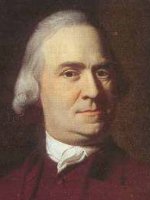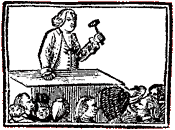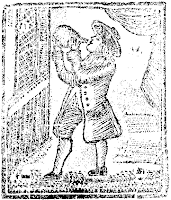 Last July, when Alaska governor Sarah Palin was a long shot at being chosen for the Republican Vice Presidential nomination, she said this on C.N.B.C.’s Kudlow & Co.:
Last July, when Alaska governor Sarah Palin was a long shot at being chosen for the Republican Vice Presidential nomination, she said this on C.N.B.C.’s Kudlow & Co.:
As for that V.P. talk all the time, I’ll tell you, I still can’t answer that question until somebody answers for me what is it exactly that the V.P. does every day? I’m used to being very productive and working real hard in an administration. We want to make sure that that V.P. slot would be a fruitful type of position, especially for Alaskans and for the things that we’re trying to accomplish up here for the rest of the U.S., before I can even start addressing that question.
After John McCain picked Palin as his running mate, some opponents criticized her question “what is it exactly that the V.P. does every day?” as showing ignorance about the position she was seeking. But in fact that question has bedeviled every American Vice President.
Discussing the start of two-party politics in the U.S. of A., Vice President
John Adams wrote to his wife
Abigail on
19 Dec 1793:
I am very apprehensive that a desperate Antifederal Party, will provoke all Europe by their insolence. But my Country has in its Wisdom contrived for me, the most insignificant Office that ever the Invention of Man contrived or his Imagination conceived: and as I can do neither good nor Evil, I must be born away by Others and meet the common Fate.
And
three days later:
My office renders me so compleatly insignificant that all Parties can afford to treat me with a decent respect which accordingly they do, as far as I observe, or hear or suspect. They all know that I can do them neither much good nor much harm.
Indeed, for many decades Vice Presidents were widely thought to do “neither much good nor much harm”—unless they actually succeeded to office. Becoming President because of the death of one’s predecessor was usually the end of a political career; not until 1904 did a party or voters think that such a President should remain in office. And when Woodrow Wilson was incapacitated because of a stroke, his wife and aides bypassed the Vice President to govern in his name.
That pattern changed with Walter Mondale in 1977. He understood Congress better than his President, and he became a significant voice in the Carter administration. In the last thirty years, only one Vice President has fit the previous mold of an ineffectual placeholder chosen for political reasons. Mondale, Bush, and Gore were important advisors to their Presidents who oversaw particular agencies or initiatives, and Cheney reshaped the executive branch to consolidate great power beneath him, as
Barton Gellman’s book Angler shows.
We should therefore interpret Palin’s July question as asking what responsibilities McCain expected to assign to his Vice President, especially if she were to take that office. What exactly
would the Vice President do in a McCain administration?
Having accepted the nomination, Palin has been cramming on a lot of subjects. Unfortunately, the role of the Vice President isn’t one of them. In an interview on Monday with the Colorado television station KUSA, Palin gave this answer to a third-grader’s question:
A vice president has a really great job, because not only are they there to support the president’s agenda, they’re like the team member, the teammate to that president, but also they’re in charge of the United States Senate so if they want to they can really get in there with the senators and make a lot of good policy changes that will make life better...
Video
here.
That’s a profound misunderstanding of what the
U.S. Constitution states about the Vice President and the Senate in Article I, Section 3:
The Vice President of the United States shall be President of the Senate, but shall have no vote, unless they be equally divided.
Being President of the Senate doesn’t mean that the Vice President is “in charge of the United States Senate.” The framers’ model for a presiding officer was
George Washington chairing the constitutional convention: he said almost nothing about the issues, but simply used his authority to ensure delegates respected the process and rules.
The framers didn’t anticipate the quick rise of political parties, which changed everything. Originally the Vice President was elected independent of the President, but the
Twelfth Amendment reflected how parties were pairing candidates for the two offices. Meanwhile, as Adams and every succeeding Vice President found out, the number-two job brought no control over the Senate’s rules or agenda. Senators—especially senior ones like John McCain—are very protective of their privileges and independence.
“President of the Senate” quickly became a courtesy title. Vice Presidents rarely even attend Senate sessions anymore. Even third-graders can understand the difference between a ceremonial role and being “in charge.”
So we’re back to the question of what exactly the V.P. would do every day in a McCain-Palin administration. If Vice President Palin really would help “make a lot of good policy changes,” she’d do that through responsibilities granted by President McCain, not through her courtesy post on Capitol Hill. Palin’s misguided and non-specific answer to KUSA implies that McCain hasn’t informed her of any role beyond being “a team member.” And the running mates’ differing statements on other matters (e.g., increasing funds for special education, campaigning in Michigan) imply that they have yet to discuss a lot more things.
Yesterday, when we left James Lovell, the illegitimate son of the South Latin School usher of the same name, he had stormed out of that school, angry that his grandfather, Master John Lovell, had whipped him so much. Young James said he would attend Master John Proctor’s Writing School instead.





